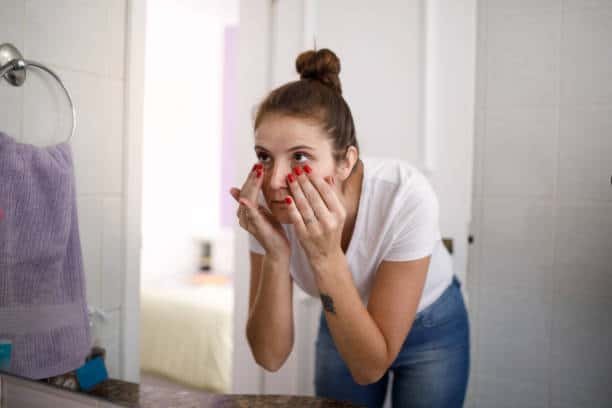What Are Dark Circles Under Your Eyes?
Dark circles under your eyes happen when the skin beneath your eyes, known as the tear trough, gets darker. This can create a shadow or change in skin color, showing up in different shades like black, brown, purple, or blue, depending on your natural skin tone. These dark circles can make you look more tired or older than you really are, and that can stress a lot of people out.
What Causes Dark Circles Under the Eyes?
Several things can lead to having dark circles under your eyes:
1. Diet and Dehydration: Eating a healthy, balanced diet and drinking enough water is super important to keep our skin cells moisturized.
2. Lack of Sleep: Not getting enough sleep can make those heavy dark circles appear under your eyes. Related…. Sleep Disorder
3. Stress and Lifestyle: Stress can mess with your sleep and overall well-being. Also, too much alcohol or drug use can add to the dark circle situation.
4. Genetics: Sometimes, dark circles run in families. It’s like a family trait you might inherit.
5. Aging: As we get older, our skin gets thinner, and we can see more blood vessels, making the under-eye area look more blue or purple.
6. Hyperpigmentation: If your skin makes more melanin because of sun exposure, it can make dark circles more noticeable. It’s like the sun brings them out even more.
What is Hydroquinone?
Hydroquinone is like a superhero for your skin – it helps lighten it up. This can be really useful for treating different kinds of skin spots that are darker than the rest.
But, there’s been a bit of a debate about whether hydroquinone is safe. Back in 1982, the U.S. Food and Drug Administration (FDA) said it’s safe and works well.
After some time, people got worried about safety, and stores stopped selling products with hydroquinone. The FDA found out that some of these products had harmful things like mercury in them. These contaminants were causing problems for people who used them.
How Does Hydroquinone Work?
Let’s dig into the secret behind hydroquinone’s superpowers. This special ingredient works by slowing down the production of melanin, the stuff that gives color to our skin. Dark circles usually happen because there’s too much melanin hanging out under our eyes, creating those shadowy patches. Hydroquinone jumps in to help, putting a stop to the enzymes that make melanin and slowly making our skin lighter. It’s like a gradual brightening process.
How to Use Hydroquinone for Dark Circles?
1. Pick the Right Product: Start by choosing a product that has hydroquinone in it. You can find it in different forms like creams, gels, and serums. It’s a good idea to chat with a skin expert, to find the one that works best for your skin.
2. Do a Patch Test: Before you start using hydroquinone, it’s a good idea to take a cautious step first: do a patch test. This means applying a small amount of hydroquinone to a discreet area of your skin, like behind your ear or on your inner arm. By doing this test, you can check if your skin reacts well or if there are any issues before using it more widely. It’s like a little trial run to ensure your skin is okay with hydroquinone.
3. Use it Regularly: Hydroquinone works its magic when you use it regularly. Your dermatologist will guide you on how often to apply it – usually once or twice a day.
4. Don’t Forget Sunscreen: Hydroquinone makes your skin more sensitive to the sun. So, sunscreen is like its trusty sidekick. Apply sunscreen with good coverage to protect your delicate under-eye skin from the sun’s rays.
Possible Side Effects and How to Avoid Them
Using hydroquinone can help with dark spots, but it’s important to know about possible side effects and how to avoid them.
Firstly, watch out for irritation. If your skin becomes a bit red, itchy, or swollen, it’s like a sign that your skin isn’t happy with the hydroquinone. To stay safe, start with a small amount, and if things seem good, you can slowly use more.
Another thing to be careful about is sun sensitivity. Hydroquinone can make your skin more delicate in the sun. It’s like your skin needs extra protection. So, when you’re using hydroquinone, be sure to wear sunscreen. It’s like putting a shield on your skin to block the sun’s strong rays.
Sometimes, people might see their skin getting darker instead of lighter. This doesn’t happen often, but it’s important to know about. Using too much hydroquinone or using it for a really long time can sometimes cause this. To prevent it, follow the instructions carefully and don’t use too much.
Keep an eye out for any strange reactions too. If your skin starts acting differently, like getting too irritated or having a bad reaction, it’s like a warning sign. Stop using hydroquinone and talk to a skin expert, like a dermatologist, to figure out what’s happening.
Remember, everyone’s skin is different, so what works for one person might not work for another. It’s like finding the right puzzle piece for your skin. If you’re ever unsure or worried, it’s best to talk to a skin expert. They can help you find the best way to get brighter, healthier skin without any surprises.
Frequently Asked Questions
1. Why Do I Have Dark Circles Under My Eyes?
Dark circles can show up under your eyes for different reasons. It could be because of your family genes, not getting enough sleep, feeling stressed, not drinking enough water, or just getting older. Also, spending too much time in the sun can make them more noticeable.
2. Can Hydroquinone Help Lighten Dark Circles?
Yes, hydroquinone is a substance that can make your skin lighter. It works by slowing down the production of melanin, the stuff that gives color to your skin. Using it carefully can gradually make your dark circles lighter. But it’s important to follow advice from experts to avoid any possible problems.
3. How Can I Prevent Dark Circles?
You can do a few things to stop dark circles from showing up. Eat a balanced diet, drink enough water, make sure to get a good night’s sleep, find ways to deal with stress, and shield your skin from the sun. Using a good sunscreen and living a healthy life can help keep dark circles away.
4. Are Dark Circles a Sign of a Medical Emergency?
Normally, dark circles are not a sign of something really serious. They’re often just a worry about how you look and can be caused by your lifestyle or family history. But if you suddenly see big changes or other problems with your health, it’s smart to talk to a doctor to make sure there’s nothing else going on.


